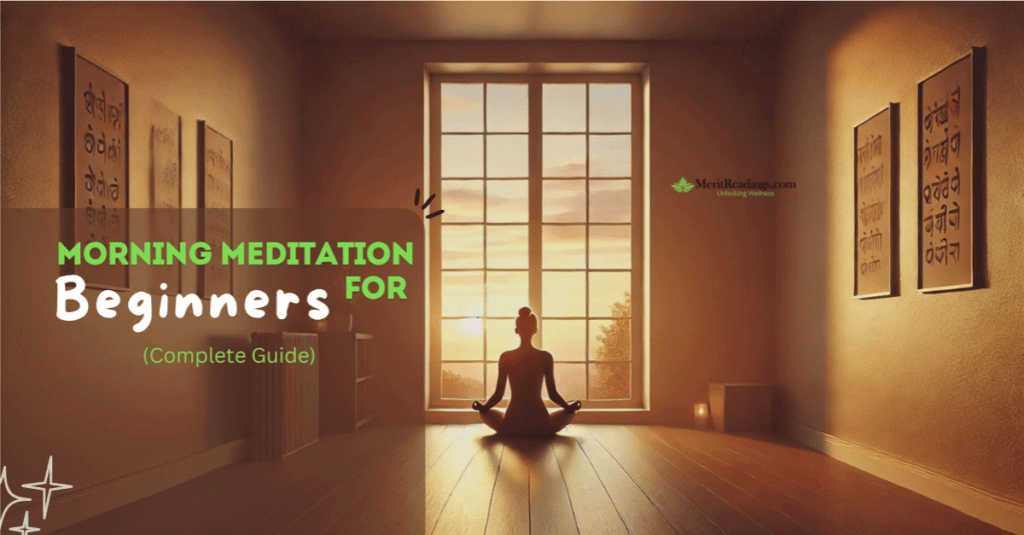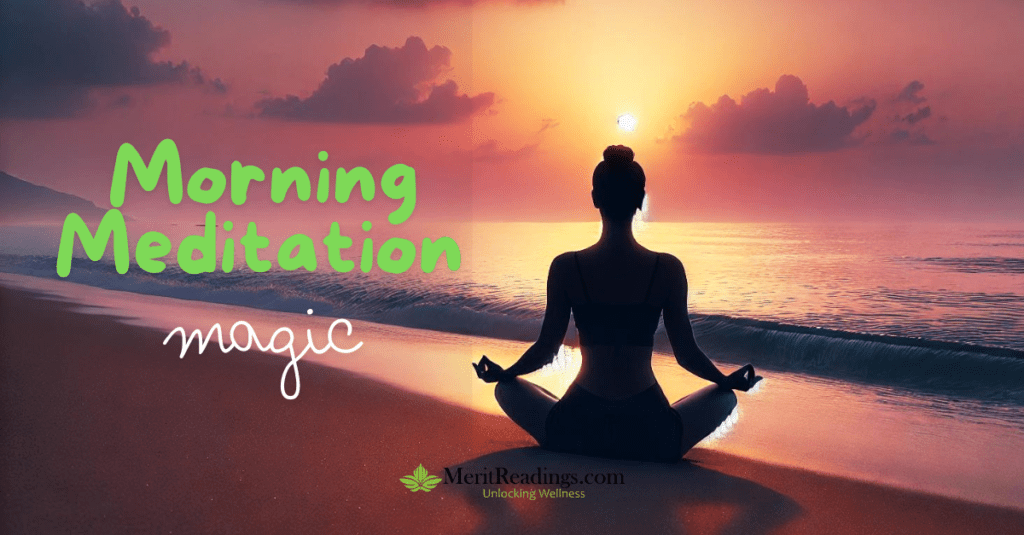Starting your day with meditation can be very helpful and set the tone for your entire day. It calms your mind and prepares you for the day. Morning meditation for beginners is an easy way to feel better mentally and emotionally. It can also help you be more productive and energetic.
Meditation is a simple practice. You focus your mind on one thing. This guide will help you learn how to get better at meditation. It will show you the benefits and steps to start your journey.
Understanding Morning Meditation

Morning meditation is a practice of calming the mind early in the morning. It has been around for centuries. It involves focusing on the present moment. Mindfulness is about being aware, while meditation is about focusing deeply. Morning meditation has many benefits supported by science. It helps you to relax and improve your overall well-being.
Benefits of Morning Meditation

Mental and Emotional Benefits
- Reduces stress and anxiety
- Improves mood and emotional balance
- Enhances mental clarity and focus
- Lowers blood pressure
- Improves sleep quality
- Boosts immune system
Productivity and Energy
- Increases energy levels
- Enhances overall productivity
- Promotes a positive mindset
Spiritual Growth and Self-Awareness
- Fosters a deeper connection with yourself
- Encourages spiritual growth and understanding
- Promotes mindfulness and presence in the moment
Getting Started with Morning Meditation

1. Step-by-Step Guide for Beginners
- Find Your Spot
- Choose a quiet and comfortable place where you won’t be disturbed. This will help you focus and make your practice more enjoyable.
- Set a Specific Time
- Decide on a specific time for your meditation practice, ideally in the morning. This helps set a regular habit and start your day with mindfulness.
- Choose Your Meditation Style
- Silent Meditation: This allows for personal reflection and focusing on your breath without external guidance.
- Guided Meditations: These can be useful for beginners as they provide structured support and instructions.
- Set Your Intention
- Before starting, establish a clear intention for your meditation. This could be something you want to achieve or a state of mind you wish to cultivate.
- Start Your Session
- Close Your Eyes: Gently close your eyes and take a few deep breaths to center yourself.
- Focus on Your Breath: Pay attention to the sensation of your breath as you inhale and exhale.
- End with Gratitude: Finish your session with a moment of gratitude or a positive intention for the day.
2. Building Consistency

The Importance of Daily Practice
Meditating daily helps form a habit and integrates mindfulness into your life. Consistency is crucial for experiencing the full benefits of meditation, such as increased calm and focus.
30-Day Meditation Challenge
To establish a regular practice, start with a 30-day challenge. Commit to meditating every day for a month. Even short daily sessions can help build a strong habit and make meditation a natural part of your routine.
Gradually Increasing Duration
As you become accustomed to meditating, slowly increase the duration of your sessions. Start by adding a few minutes each week. This gradual approach helps you stay comfortable and engaged with your practice.
People Also Read: How to Start a Meditation Routine
3. Overcoming Common Challenges

Handling Distractions
Distractions are a normal part of meditation. When your mind wanders, gently guide your focus back to your breath or your chosen anchor. Accept distractions as part of the process without frustration.
Staying Motivated
Maintain motivation by setting small, achievable goals and tracking your progress. Remind yourself of the benefits of meditation and celebrate your successes to keep yourself inspired.
Dealing with Restlessness or Boredom
Restlessness and boredom can occur during meditation. Acknowledge these feelings without judgment and return to your breath or focus. Recognize that these experiences are part of the practice and will become easier over time.
4. Expanding Your Practice

Incorporating Mindfulness into Daily Tasks
Apply mindfulness to everyday activities like brushing your teeth or drinking coffee. This practice helps you stay present throughout the day and integrates meditation benefits into your routine.
Other Mindful Practices
Explore additional mindful practices, such as stretching or mindful eating. These practices complement meditation and help deepen your overall mindfulness.
Checking In on Your Progress
Regularly evaluate your meditation practice. Reflect on changes in your mood, stress levels, and overall well-being. Adjust your practice as needed to ensure it continues to meet your needs and goals.
5. Creating a Mindful Lifestyle

Bringing Meditation Benefits into Daily Life
Extend the mindfulness cultivated through meditation to all areas of your life. Being present in your interactions and daily tasks enhances your overall well-being and creates a mindful lifestyle.
Long-Term Effects of Consistent Practice
Consistent meditation offers long-term benefits such as improved emotional regulation and reduced anxiety. These benefits contribute to a balanced and mindful approach to life.
Adapting Your Routine as You Progress
As you advance in your meditation practice, adapt your routine to reflect your growth. Experiment with new techniques or extend your sessions to keep your practice engaging and aligned with your evolving needs.
Basic Techniques for Morning Meditation

- Breathing Techniques
Breath flowing is vital in meditation. Take deep breaths to start your practice. Focus on your breathing to help your mind relax.
- Guided Morning Meditation
Guided morning meditation is great for beginners. It provides spoken instructions and helps you stay focused, relax, and concentrate. Many resources are available, such as apps, YouTube, and Spotify.
- Mantra Meditation
In mantra meditation, you repeat words or phrases to stay focused. This helps keep your mind from wandering. Examples include words like “peace” or “calm.”
Advanced Meditation Practices

- Walking Meditation
Walking meditations combine light cardio with mindfulness. Focus on natural sounds and your body movements. This helps you stay present.
- Staring Meditation
In staring meditation, you focus on an object to avoid distractions. This helps improve concentration.
- Body Scan Meditation
A body scan meditation helps release tension. Focus on different parts of your body one at a time to promote relaxation.
Resources and Tools
Recommended Apps and Websites
There are many helpful meditation apps and online resources. They offer guided meditations for healing and positive energy. Popular options include Headspace, Calm, and Insight Timer.
Books and Podcasts
Reading and listening can deepen your understanding. They can also inspire. A great book is “The Miracle of Mindfulness” by Thich Nhat Hanh. You can find it on Amazon. For podcasts, “The Daily Meditation Podcast” is a beautiful resource. Listen to it on Apple Podcasts.
Meditation Accessories
Use accessories like cushions, timers, and music to enhance your practice. These meditation tools can make your meditation more comfortable and enjoyable.
Conclusion
Morning meditation is a simple and powerful tool for improving overall well-being. It helps you start your day with a clear mind and positive energy. Set aside just a few minutes each morning with your eyes closed.
Remember to be patient with yourself. Use guided morning meditation for healing and meditation tools like apps or soothing music. You will notice the benefits in your morning routine and throughout the day with consistent practice. Embrace the journey and enjoy the peace and focus that morning meditation brings.
FAQs
1. What questions to ask after meditation?
- How do I feel emotionally and physically right now?
- What thoughts or insights came up during my meditation?
- Did I notice any changes in my breathing or body sensations?
- How did I handle any distractions or wandering thoughts?
- What intention or goal would I like to set for the rest of my day?
2. What is the science behind morning meditation?
Morning meditation positively affects the brain and body. Research suggests that meditating early in the morning can:
- Reduce stress by lowering cortisol levels.
- Enhance focus and cognitive function through improved attention and memory.
- Improve emotional regulation by increasing activity in the brain’s prefrontal cortex.
- Boost overall well-being by promoting a more positive outlook and reducing anxiety.
3. Why is it important to meditate first thing in the morning?
Meditating first thing in the morning sets a calm tone for the day. It helps you:
- Start your day with clarity and intention, reducing stress before it begins.
- Enhance focus and productivity by clearing mental clutter.
- Cultivate a consistent practice by making meditation a part of your morning routine, which builds habit and discipline.
- Improve emotional resilience, making it easier to handle challenges throughout the day.
4. What is the first rule in meditation?
The first rule in meditation is to be present. Focus on the current moment and bring your attention back whenever it drifts. This means letting go of past or future concerns and gently guiding your mind back to your chosen point of focus, such as your breath.



